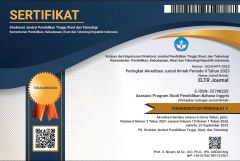THE EFFECTS OF WATCHING ENGLISH-SUBTITLED VIDEOS ON EFL STUDENTS’ VOCABULARY LEARNING
Abstrak terlihat: 1437 / PDF terunduh: 971DOI:
https://doi.org/10.37147/eltr.v6i2.130Keywords:
EFL, listening, subtitled video, vocabulary learningAbstract
This paper studies how watching English-subtitled videos affect EFL (English as a Foreign Language) students’ vocabulary learning. 20 English major students watched an English video about a classic ghost tale twice. The control group (n = 10) watched the unsubtitled video, while the experimental group (n = 10) watched the subtitled video. After watching it, they did the test of vocabulary and the test of understanding. A descriptive-qualitative method was utilized in this paper. It reveals that watching a video with its English subtitle affects the vocabulary learning; the experimental group achieved a higher score in both tests than the control group. However, the experimental group’s mean score was only slightly, not significantly, high. Pedagogical implications are found to utilize English-subtitled videos for better vocabulary learning.
Downloads
References
Anelli, L. (2015). Book review: Subtitles and language learning: Principles, strategies and practical experiences. System, 55, 166-168. https://doi.org/10.1016/j.system.2015.10.002
Day, R. R., Omura, C., & Hiramatsu, M. (1991). Incidental EFL vocabulary learning and reading. Reading in a Foreign Language, 7(2), 541-551. http://hdl.handle.net/10125/67035
Ender, A. (2016). Implicit and explicit cognitive processes in incidental vocabulary acquisition. Applied Linguistics, 37(4), 536-560. https://doi.org/10.1093/applin/amu051
Hulstijn, J. H. (2013). Incidental learning in second language acquisition. in C. A. Chapelle, The Encyclopedia of Applied Linguistics (pp. 1-5). Oxford: Wiley Blackwell. https://doi.org/10.1002/9781405198431.wbeal0530
Laufer, B., & Levitzky, T. A. (2017). What type of vocabulary knowledge predicts reading comprehension: Word meaning recall or word meaning recognition? The Modern Language Journal, 729-741. https://doi.org/10.1111/modl.12431
Laufer, B., & Rozovski-Roitblat, B. (2015). Retention of new words: Quantity of encounters, quality of task, and degree of knowledge. Language Teaching Research, 19(6), 687-711. https://doi.org/10.1177/1362168814559797
Li, S. (2016). The construct validity of language aptitude: A meta-analysis. Studies in Second Language Acquisition, 38(4), 801-842. https://doi.org/10.1017/S027226311500042X
Matthews, J. (2018). Vocabulary for listening: Emerging evidence for high and mid-frequency vocabulary knowledge. System, 72, 23-36. https://doi.org/10.1016/j.system.2017.10.005
Mayer, R. E. (2014). The Cambridge handbook of multimedia learning (2nd ed.). Cambridge: University Press. https://doi.org/10.1017/CBO9781139547369
Paivio, A. (1986). Mental representations: A dual coding approach. New York: Oxford University Press.
Pattemore, A., & Muñoz, C. (2020). Learning L2 constructions from captioned audio-visual exposure: The effect of learner-related factors. System, 93, 102303. https://doi.org/10.1016/j.system.2020.102303
Perez, M. M. (2020). Incidental vocabulary learning through viewing video. Studies in Second Language Acquisition, 42(4), 749-773. https://doi.org/10.1017/S0272263119000706
Perez, M. M., Peters, E., & Desmet, P. (2018). Vocabulary learning through viewing videos: The effect of two enhancement techniques. Computer Assisted Language Learning, 31(1-2), 1-26. https://doi.org/10.1080/09588221.2017.1375960
Peters, E., & Webb, S. (2018). Incidental vocabulary acquisition through viewing L2 television and factors that affect learning. Studies in Second Language Acquisition, 40(3), 551-577. https://doi.org/10.1017/S0272263117000407
Reynolds, B. L. (2015). The effects of word form variation and frequency on second language incidental vocabulary acquisition through reading. Applied Linguistics Review, 6(4) 467-497. https://doi.org/10.1515/applirev-2015-0021
Saito, K. (2017). Effects of sound, vocabulary, and grammar learning aptitude on adult second language speech attainment in foreign language classrooms. Language Learning, 67(3), 665-693. https://doi.org/10.1111/lang.12244
Sweller, J. (2011). Cognitive load theory. In J. P. Mestre, & B. H. Ross, Psychology of Learning and Motivation, 55, 37-76. London: Academic Press. https://doi.org/10.1016/B978-0-12-387691-1.00002-8
Teng, M. F. (2020). Retention of new words learned incidentally from reading: Word exposure frequency, L1 marginal glosses, and their combination. Language Teaching Research, 24(6), 785-812. https://doi.org/10.1177/1362168819829026
Teng, M. F. (2019). The effects of video caption types and advance organizers on incidental L2 collocation learning. Computers & Education, 141, 103655. https://doi.org/10.1016/j.compedu.2019.103655
Trenkic, D. (2017). Book review: Captioned media in foreign language learning and teaching: Subtitles for the deaf and hard-of-hearing as tools for language learning. System, 65, 175-177. https://doi.org/10.1016/j.system.2017.01.002
van Zeeland, H., & Schmitt, N. (2013a). Incidental vocabulary acquisition through L2 listening: A dimensions approach. System, 41(3), 609-624. https://doi.org/10.1016/j.system.2013.07.012
van Zeeland, H., & Schmitt, N. (2013b). Lexical coverage in L1 and L2 listening comprehension: The same or different from reading comprehension? Applied Linguistics, 34(4), 457-479. https://doi.org/10.1093/applin/ams074
Vanderplank, R. (2016). Captioned media in foreign language learning and teaching. London: Palgrave Macmillan. https://doi.org/10.1057/978-1-137-50045-8
Vidal, K. (2011). A comparison of the effects of reading and listening on incidental vocabulary acquisition. Language Learning, 61(1), 219-258. https://doi.org/10.1111/j.1467-9922.2010.00593.x
Webb, S., & Chang, A. C. (2015). Second language vocabulary learning through extensive reading with audio support: How do frequency and distribution of occurrence affect learning? Language Teaching Research, 19(6), 667-686. https://doi.org/10.1177/1362168814559800
Webb, S., & Nation, P. (2017). How vocabulary is learned. Oxford: University Press.
Wen, Z. E., Biedro?, A., & Skehan, P. (2017). Foreign language aptitude theory: Yesterday, today and tomorrow. Language Teaching, 50(1), 1-31. https://doi.org/10.1017/S0261444816000276
Winke, P. (2013). An Investigation into second language aptitude for advanced Chinese language learning. Modern Language Journal, 97(1), 109-130. https://doi.org/10.1111/j.1540-4781.2013.01428.x
Downloads
Published
How to Cite
Issue
Section
License
Copyright (c) 2022 Rizky Purwa Lestari, Rolisda Yosintha

This work is licensed under a Creative Commons Attribution-ShareAlike 4.0 International License.











 ELTR Journal,
ELTR Journal, 